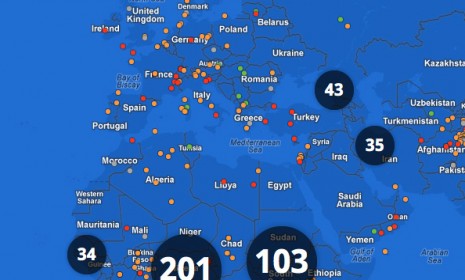Google's next mission: Save dying languages
Obscure tongues like Arogonese and Navajo are just a few generations away from disappearing. Enter Google, which aims to preserve them digitally

A free daily email with the biggest news stories of the day – and the best features from TheWeek.com
You are now subscribed
Your newsletter sign-up was successful
By some estimates, about half of the world's languages could disappear by the end of this century. And that's why Google's philanthropic arm, Google.org, is launching a new initiative called the Endangered Languages Project, which aims to digitally archive the world's lesser-known tongues and the heritages they're integral to. Here, a brief guide to the search giant's noble new undertaking:
What kind of languages are disappearing?
Languages like Arogonese, which can be found tucked away in northern Spain. Spoken by fewer than 10,000 people, the dying language is on the brink of disappearing in a few generations because so few children actually learn it, instead opting for more universal tongues like Spanish. Navajo and Ojibwa, both native to the Americas, are also on the verge of extinction. So is Koro, which is indigenous to a small population living in the mountains of northeast India. It's spoken by no more than 4,000 people.
The Week
Escape your echo chamber. Get the facts behind the news, plus analysis from multiple perspectives.

Sign up for The Week's Free Newsletters
From our morning news briefing to a weekly Good News Newsletter, get the best of The Week delivered directly to your inbox.
From our morning news briefing to a weekly Good News Newsletter, get the best of The Week delivered directly to your inbox.
What will Google's website actually do?
EndangeredLanguages.com will catalog roughly 3,500 of the world's little-spoken tongues — about half of the Earth's 7,000 total languages. "With every language that dies, humanity is in danger of losing an enormous cultural heritage," says Loek Essers at Computerworld. As each one vanishes, "an understanding of how humans relate to the world around them, scientific, medical, and botanical knowledge" are all lost, as is "the expression of [a] communities' humor, love, and life." (Watch Google's promo video below.)
How can users experience the languages?
The languages can be identified by their location on a map, or navigated to from a list that's broken down into four categories: At risk, endangered, severely endangered, or the "ominous-sounding" vitality unknown, says Ingrid Lunden at TechCrunch. Users can upload video or audio samples (this traditional folk song in Koro, for example), as well as share their expertise about a language.
A free daily email with the biggest news stories of the day – and the best features from TheWeek.com
Who will run the project?
The search giant is behind the site's development and launch, but plans to hand the project off to The First People's Cultural Council (FPCC), which will handle strategy and outreach, working with the Institute of Language Information and Technology at Eastern Michigan University. "Languages are entities that are alive and in constant flux, and their extinction is not new," write the site's creators. "But today we have the tools and technology at our fingertips that could become a game changer."
Take a look: